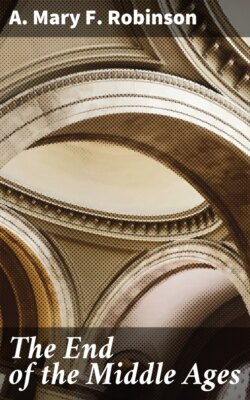Читать книгу The End of the Middle Ages - A. Mary F. Robinson - Страница 32
На сайте Литреса книга снята с продажи.
VIII.
ОглавлениеTable of Contents
God, then, is Nothing; Erigena has given us the phrase, for Nihilum, he says, is the infinite essence of God. The soul is Nothing; “a fathomless annihilation of self,” in Tauler’s words, “an utter nothingness,” in Eckhart’s sentence. And, lastly, the world is nothing, purum Nihil, and as unreal as the rest. Already, in the close of the twelfth century, David of Dinant had declared that Everything is at the same time Spirit, Matter, and God. The later Mystics added a new line to his Thesis: All is One and All is Nothing.
Such is the result of this strange Idealism, which sacrifices from first to last the idea of personality to the conception of God. These are the dogma of this singular phase of thought and feeling; a phase which unites all that is cold and formal in philosophy with all that is unreasoning, perfervid, and hysterical in a Religious Revival. The doctors and preachers of Speculative Mysticism, have trances no less real than those of Saint Francis; but what they contemplate with rapture is not the idea of Infinite Love. It is Infinite Nothing which fills them with ecstasy. And these Mystical thinkers are as precise and as liable to become the mere pedants of a system, as any follower of Kant or Comte. And yet, though they seek to use only their reason, they despise reason. These philosophers look upon reason as the humble handmaiden of ecstasy. And that divine ecstasy is excited by the thought of a Nihilum.
This indeed appears almost an absurd position; and yet the position of the Mystics was honourable and intelligent. They attempted to answer questions which even to-day the theologians elude (see Newman, “Grammar of Assent,” p. 210). “Whence comes Evil?” Evil, they reply, is not created by God, but, so to speak, the blanks and spaces not filled up by His creation. Evil and pain have no Real Existence; they are but a deficiency of vitality; they are negative and temporary qualities unrecognized by an unconscious God innocent of inflicting them. “Why are we created responsible beings without our own consent?” Our bodies are not created by God and we are not responsible to Him for their errors. They are the expressions of our Eternal souls—their own expressions at their own desire as a modus vivendi in the world. “How can God need our action if He is omnipotent? If omnipotent, how tolerant of Evil? If permitting suffering, sin, and Hell, how then All-loving? If All-loving, how Just?” These questions are all answered by the mystical conception of God as a Divine Passivity, an unconscious Fund of Existence. All that is impossible and absurd in the theories of the Mystics is caused by adapting them to religious ideas. They had to explain the immortality of the soul, … and they spoke of eternal absorption into an Infinite Nothing. They had to explain a good and omnipotent God creating an evil and impotent humanity. They made the one nothing and the other nothing.
